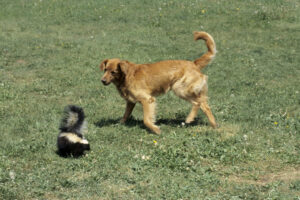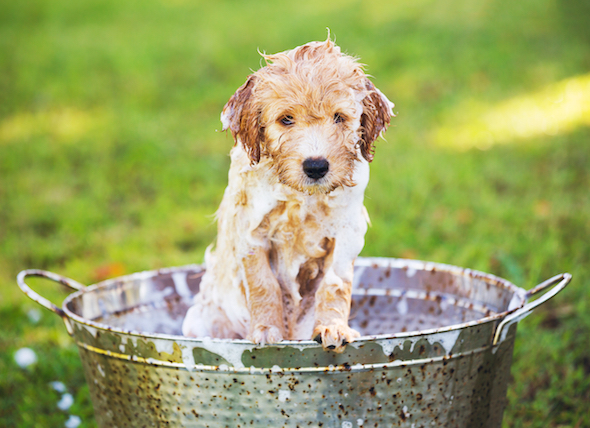Skunks, especially the striped variety, are popular members of the wildlife population in Canada. Like many other wildlife animals, from time to time they come into contact with household pets. These interactions are among the reasons behind the methods for skunk removal that Pickering residents use. Dogs are more likely to have encounters with skunks and other wildlife animals because they instinctively hunt them.
Has your dog had an encounter with a skunk? Unpleasant isn’t it? But did you know that aside from the smell associated with the fluid that skunks spray, your pet could have been exposed to diseases as well? If your pet has not had such an incident, chances are you’re concerned about the possibility.
Always keep your pets on a leash and away from wildlife.
Avoid a Skunk Encounter
Knowing the favourite hiding spots for skunks will go a long way in helping you avoid the animals. They love to burrow into rotted tree roots and stumps, But they also live under cellars, in piles of rocks and in piles of old brush among others. You can avoid a skunk encounter by steering clear of these areas or, better yet, getting rid of clumps of bushes and piles of stone and any other items that may harbour them.
Be careful when getting your lawn cut. Loud noises like lawn mower engines and barking dogs make skunks feel threatened, which increases the likelihood of people and pets getting sprayed. Check carefully as the snow melts to ensure that you don’t stumble upon skunk dens unexpectedly. If you do encounter one, retreat as slowly as you can so as not to alarm the skunk.
Neutralizing the Smell
If your pet (most likely your dog since they are the pets who usually encounter skunks) has been sprayed by a skunk, one of the things you’ll have to deal with is the stench. Skunk stink is not impossible to remove but it is extremely challenging, so prepare for a difficult task. Ensure that you wear disposable clothing and gloves.
The best place to wash your pet to remove skunk stink is outside. If you must venture inside do not let any of the skunk fluid touch any part of the building or furniture. In fact, you should first use paper towels to blot the area that got sprayed to prevent transmission of the smell. When bathing your pet, wash the area that got sprayed first. Doing this ensures that the odour doesn’t spread. Lather and wash the pet’s entire body three to five times until the smell is gone. A good de-skunking shampoo is a great thing to have on hand if you are a pet owner living in skunk occupied territory like Pickering.

There are multiple home remedies to cure your pets from skunk spray.
Seek Professional Help
Since wild animals like skunks are known to carry diseases such as rabies, it is very important that you get your pet to a vet immediately after a skunk encounter. Your vet will determine whether your pet has been exposed to any dangerous diseases and act accordingly.
To get professional help with skunk removal, Pickering residents can contact Skedaddle. Our team of humane animal control experts are experienced in skunk control and removal. We can help you to get rid of skunks before skunk encounters occur. We can also help you to convert your property into skunk-proof spaces to prevent skunk invasion of your premises.



